 W
WIsabel Maria de Alcântara, Duchess of Goiás, was a Brazilian noble, the illegitimate daughter of Emperor Pedro I of Brazil and Domitila de Castro, Marchioness of Santos.
 W
WAntônio Francisco Lisboa, more commonly known as Aleijadinho, was a sculptor and architect of Colonial Brazil, noted for his works on and in various churches of Brazil. His works are considered some of the best examples of Portuguese colonial architecture in Brazil.
 W
WJosé Ferraz de Almeida Júnior, commonly known as Almeida Júnior, was a Brazilian artist and designer; one of the first there to paint in the Realistic tradition of Gustave Courbet and Jean-François Millet. The "Dia do Artista Plástico" is celebrated on his birthday.
 W
WManuel Antônio de Almeida was a Brazilian satirical writer, medician and teacher. He is famous for the book Memoirs of a Police Sergeant, written under the pen name Um Brasileiro. He is the patron of the 28th chair of the Brazilian Academy of Letters.
 W
WLuís Alves de Lima e Silva, Duke of Caxias, nicknamed "the Peacemaker" and "Iron Duke", was an army officer, politician and monarchist of the Empire of Brazil. Like his father and uncles, Caxias pursued a military career. In 1823 he fought as a young officer in the Brazilian War for Independence against Portugal, then spent three years in Brazil's southernmost province, Cisplatina, as the government unsuccessfully resisted that province's secession in the Cisplatine War. Though his own father and uncles renounced Emperor Dom Pedro I during the protests of 1831, Caxias remained loyal. Pedro I abdicated in favor of his young son Dom Pedro II, whom Caxias instructed in swordsmanship and horsemanship and eventually befriended.
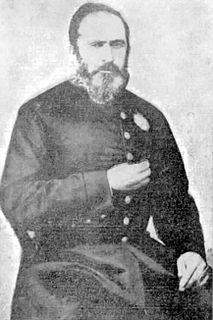 W
WJosé Luís Mena Barreto was an army officer, politician and monarchist of the Empire of Brazil. He came from a wealthy family with a tradition of military service. José Luís entered the army in 1836, during the Ragamuffin War, a secessionist rebellion. The conflict lasted for almost ten years, and he fought in several military engagements at that time.
 W
WJosé Bonifácio de Andrada e Silva was a Brazilian statesman, naturalist, mineralist, professor and poet, born in Santos, São Paulo, then part of the Portuguese Empire. He was one of the most important mentors of Brazilian independence, and his actions were decisive for the success of Emperor Pedro I. He supported public education, was an abolitionist and suggested that a new national capital be created in Brazil's underdeveloped interior. His career as naturalist was marked by the discovery of four new minerals.
 W
WFrancisco Silviano de Almeida Brandão was a Brazilian politician who was elected Vice President of Brazil, but died before taking office.
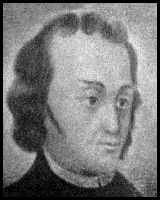 W
WAntônio Pereira de Sousa Caldas was a Colonial Brazilian poet, priest and orator, patron of the 34th chair of the Brazilian Academy of Letters.
 W
WDomitila de Castro Canto e Melo, 1st Viscountess with designation as a Grandee, then 1st Marchioness of Santos, was a Brazilian noblewoman and the long-term mistress and favorite of Emperor Pedro I.
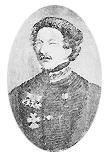 W
WGastão Luís Henrique Robert d'Escragnolle, Baron d'Escragnolle was a Brazilian politician, military figure and nobleman. His father, Alexandre Luís Maria Roberto d'Escragnolle, was the Count d'Escragnolle.
 W
WAntonia Alves ("Jovita") Feitosa, was a military heroine and a symbol for the war against sexism.
 W
WMajor Nicoletti was a noticeable federalist public personality, revolutionary, sub-intendant, administrator and founder of the second most visited touristic city in Brazil, the city of Gramado. Born in Italy, he immigrated to Brazil with his parents Giuseppe Nicoletti and Theresa Costa Nicoletti. He participated on the 1893 Federalist Riograndense Revolution and earned the rank of Major.
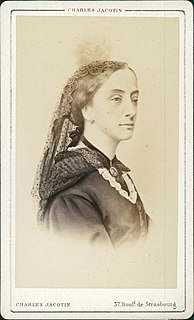 W
WDona Francisca was a princess of the Empire of Brazil, who became Princess of Joinville upon marrying François d’Orléans, son of the French king Louis Philippe I. The couple had three children. Through their oldest daughter, Francisca and François are the ancestors of Jean, Count of Paris, the present Orléanist pretender to the French throne.
 W
WCândido da Fonseca Galvão, also known as Dom Obá II D'África, was a Brazilian military officer and nobleman. A son of freed Africans, and a grandson of the Obá Abiodun of the Oyo Empire, he held the title of Omoba among the Yoruba people of West Africa. Galvão’s father, Benvindo, was freed on an unknown date in the first half of the nineteenth century. Upon his freedom, he sought to take advantage of the emerging Lençóis diamond rush in north eastern Brazil. Evidence suggests that he arrived around the year of 1845, although there are no birth certificates to corroborate, it is estimated his son Cândido da Fonseca Galvão was born shortly after. [1]
 W
WAntônio Carlos Gomes was the first New World composer whose work was accepted by Europe. The only non-European who was successful as an opera composer in Italy, during the "golden age of opera", contemporary to Verdi and Puccini and the first composer of non-European lineage to be accepted into the Classic tradition of music.
 W
WTomás António Gonzaga was a Portuguese-born Brazilian poet. One of the most famous Neoclassic colonial Brazilian writers, he was also the ouvidor and the ombudsman of the city of Ouro Preto, as well as the desembargador of the appeal court in Bahia. He wrote under the pen name Dirceu.
 W
WDona Isabel, nicknamed "the Redemptress", was the Princess Imperial of the Empire of Brazil and the Empire's regent on three occasions. Born in Rio de Janeiro as the eldest daughter of Emperor Pedro II and Empress Teresa Cristina, she was a member of the Brazilian branch of the House of Braganza. After the deaths of her two brothers in infancy, she was recognized as her father's heir presumptive. She married a French prince, Gaston, Count of Eu, in an arranged marriage, and they had three sons.
 W
WJosé Teófilo de Jesus was a Brazilian painter and gilder. He is the most noted representative of the Escola Baiana or Bahian School of painting. His work was eclectic, characterized by the passage from the Baroque to the Rococo, with reference to Neoclassical traits. De Jesus was of pardo, or mixed ethnic ancestry and lived into his nineties; little else is known of his life. His production was apparently vast, but many of his works are only identified by oral tradition. Although he is known as one of the great names of the Brazilian Baroque, and one of its final artists, details of his life and a full account of his works remain unclear.
 W
WCarlos Frederico Lecor was a Portuguese general and politician. He was the first Baron of Laguna, in Portugal, and later ascended to Viscount of Laguna, in Brazil.
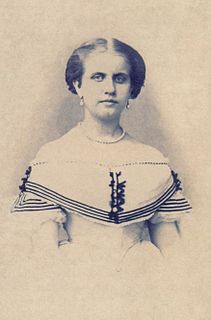 W
WPrincess Leopoldina of Brazil was the daughter of Emperor Pedro II and Empress Teresa Cristina. She shared the first name of her grandmother, Leopoldina of Habsburg, first Empress of Brazil.
 W
WPacífico Licutan was a Muslim slave and Islamic community and religious leader in colonial Brazil in the 1800s, and was involved in the 1835 Malê Revolt in a leadership capacity. He was not killed in the revolt but did die shortly afterwards, after February 11, 1835.
 W
WMaria Isabel de Alcântara Bourbon was the third daughter of Emperor Pedro I of Brazil and his mistress, Domitila de Castro, Marchioness of Santos.
 W
WTomás Antônio Maciel Monteiro, 1st Baron of Itamaracá was a Brazilian politician and magistrate. He was born in Recife, Pernambuco, to Antônio Francisco Monteiro and Joana Ferreira Maciel Gouvim.
 W
WJosé Antônio Moreira Filho, the second baron grandee of Ipanema, was a Brazilian businessman in real estate. He was a partner of José Luís Guimarães Caipora, and a member of the Brazilian nobility in the Empire of Brazil.
 W
WJosé Antônio Moreira, first baron with greatness, viscount with greatness and count of Ipanema, was a Brazilian industrialist of the branch of the metallurgy.
 W
WAna Justina Ferreira Néri was a Brazilian nurse, considered the first in her country. She is best known for her volunteer work with the Triple Alliance during the Paraguayan War.
 W
WFrancisca de Paula de Jesus - also known as Nhá Chica - was a Brazilian Roman Catholic laywoman who was a popular religious figure in Brazil known for her humble life and her dedication to God. Nhá Chica bore no surname and was an illegitimate child born to a slave mother; she herself as a slave until being freed in 1820 which allowed her to dedicate herself to the plight of the region's poor and the construction of a Marian chapel near which she resided for the remainder of her life.
 W
WJosé Maria da Silva Paranhos, the Viscount of Rio Branco was a politician, monarchist, diplomat, teacher and journalist of the Empire of Brazil (1822–1889). Rio Branco was born in Salvador, in what was then the Captaincy of Bahia, to a wealthy family, but most of the fortune was lost after his parents' deaths early in his childhood.
 W
WJosé Maria da Silva Paranhos Jr., Baron of Rio Branco was a Brazilian diplomat, geographer, historian, monarchist, politician and professor, considered to be the "father of Brazilian diplomacy". He was the son of statesman José Paranhos, Viscount of Rio Branco. The Baron of Rio Branco was a member of the Brazilian Academy of Letters, occupying its 34th chair from 1898 until his death in 1912. As a representative of Brazil, through his diplomacy, he managed to peacefully resolve all Brazil's border disputes with its South American neighbours
 W
WNilo Procópio Peçanha was a Brazilian politician who served as seventh President of Brazil. He was Governor of Rio de Janeiro State (1903–1906), then elected Vice President of Brazil in 1906. He assumed the presidency in 1909 following the death of President Afonso Pena and served until 1910.
 W
WDom Pedro I, nicknamed "the Liberator", was the founder and first ruler of the Empire of Brazil. As King Dom Pedro IV, he reigned briefly over Portugal, where he also became known as "the Liberator" as well as "the Soldier King". Born in Lisbon, Pedro I was the fourth child of King Dom João VI of Portugal and Queen Carlota Joaquina, and thus a member of the House of Braganza. When the country was invaded by French troops in 1807, he and his family fled to Portugal's largest and wealthiest colony, Brazil.
 W
WDom Pedro II, nicknamed "the Magnanimous", was the second and last monarch of the Empire of Brazil, reigning for over 58 years. He was born in Rio de Janeiro, the seventh child of Emperor Dom Pedro I of Brazil and Empress Dona Maria Leopoldina and thus a member of the Brazilian branch of the House of Braganza. His father's abrupt abdication and departure to Europe in 1831 left the five year-old as emperor and led to a grim and lonely childhood and adolescence, obliged to spend his time studying in preparation for rule. His experiences with court intrigues and political disputes during this period greatly affected his later character; he grew into a man with a strong sense of duty and devotion toward his country and his people, yet increasingly resentful of his role as monarch.
 W
WFloriano Vieira Peixoto, born in Ipioca, nicknamed the "Iron Marshal", was a Brazilian soldier and politician, a veteran of the Paraguayan War, and the second President of Brazil. He is the first Vice President of Brazil to have succeeded a former President mid-term.
 W
WMaria Quitéria was a Brazilian lieutenant and national heroine. She served in the Brazilian War of Independence in 1822–23 dressed as a man. She was promoted to cadet and Lieutenant and decorated with the Imperial order. She has been called "Brazilian Joan of Arc," and has become a kind of national legendary figure. Quitéria was the first woman to serve in a military unit in Brazil. She, along with Maria Felipa de Oliveira and Sister Joana Angélica (1761-1822), are known as the three Bahian women resistance fighters in the War of Independence against the Portuguese.
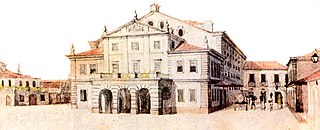 W
WGaetano Ricciolini was an Italian bass-baritone and a choreographer who helped introduce opera and dance in South America.
 W
WJosé da Silva Lisboa, first Baron and Viscount of Cairu, was an economist, historian, jurist, publicist and Brazilian politician, active at the time of Independence of the Brazil and credited for the promotion of important economic reforms. He held various positions in the economic and political administration of Brazil after the transfer or the Portuguese Court to Brazil in 1808, including Deputy of the Royal Chamber of Commerce and Judge of the House of Supplication.
 W
WJoão Lins Vieira Cansação de Sinimbu, Viscount of Sinimbu was a Brazilian politician. He was President of the Council of Ministers from 5 January 1878 until 28 March 1880. He served as the President of the Senate from 1887 to 1888.
 W
WIrineu Evangelista de Sousa, the Viscount of Mauá was a Brazilian entrepreneur, industrialist, banker and politician. Born to a family of small estancieiros (ranchers), Mauá became one of the world's richest men; by 1867, his wealth was larger than the annual budget of the Brazilian Empire. He was called the Rothschild of the South American continent by the New York Times in 1871. He received the titles of baron (1854) and visconde com grandeza (1874) of Mauá. A pioneer in several areas of the economy of Brazil, one of his greatest achievements was to start the construction of the Mauá Railroad, the first railroad in Brazil.
 W
WFélix Émile Taunay, Baron of Taunay, was a French Brazilian painter, and drawing and Greek teacher. He was the father of famous writer and politician Alfredo d'Escragnolle Taunay, the Viscount of Taunay.
 W
WDonizetti Tavares de Lima was a Brazilian Roman Catholic priest. He was ordained to the priesthood in 1908 and served as a parish priest in various churches across Brazil but was noted for his extensive work at the San Antonio church in Tambaú where he lived most of his life. He was famed for his reported miracles and other wonders that began around the 1920s and continued until his death. But this drew some consternation from the local bishop in 1955 who ordered him to give one final blessing to the public and then to retreat to normal parish duties with no more talk of miracles or healings. He did so in obedience and continued to exercise his functions as a parish priest until his death.
 W
WFrancisco Adolfo de Varnhagen, Viscount of Porto Seguro, was a Brazilian diplomat and historian. He is the patron of the 39th chair of the Brazilian Academy of Letters. He is considered "the father of modern Brazilian historical scholarship."